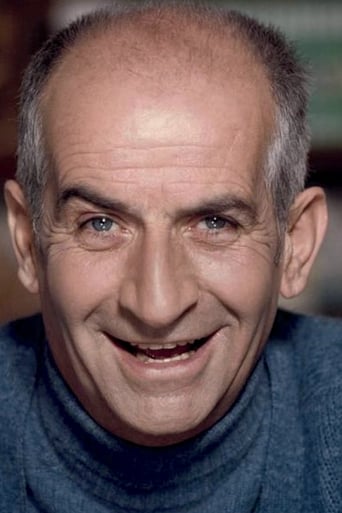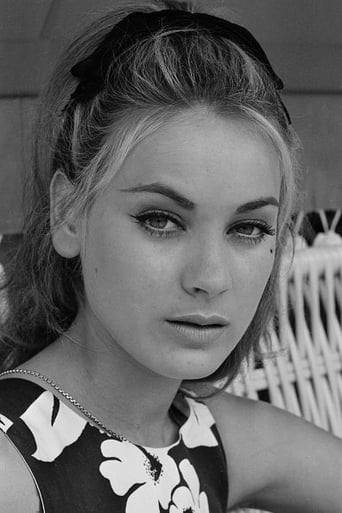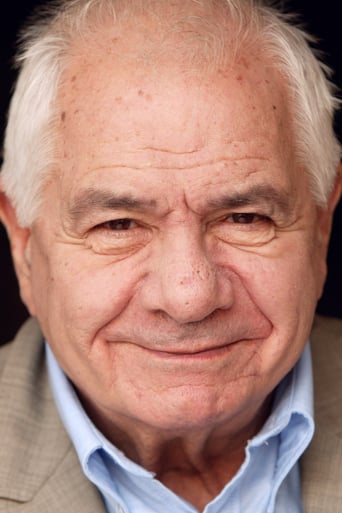ElMaruecan82
Said differently, this is the film that launched the career of Louis de Funès in 1964. He was no newcomer and had already twenty years of experience collecting small roles on the screen and bigger ones on the stage, but fate was only waiting for the last scraps of hair to disappear on the top of his head so he could get on the top of the box office for almost two decades. The movie would also span a series of sequels and become the most emblematic role of his career. See, there are many elements of history movie buffs will enjoy in this film so I'm afraid it doesn't leave much to say about the film itself, but the elements of context are vital because they help to understand the reasons begind one of the most successful careers of French cinema.We are in the middle of the 60's, at the culmination of what they call the "Glorious Thirties", France has become a major international political player, intoxicated by the aura of General De Gaulle, the Algerian war is over, and the first baby boom generation is coming to age and can enjoy their first great summer holidays. But as far as summer was concerned, there was one place to be, and it was Saint Tropez. You don't know how big Saint Tropez was in the 60's? Are you kidding?The place's story is almost as legendary as Las Vegas, it was a remote beach station in the Mediterranean South that became cherished by the New Wave stars, one of its most memorable ambassadors was the loveliest mermaid: Brigitte Bardot. One running gag in the 1972 comedy "The Annuity" is that the film starts so early in time the name "Saint Tropez" never rings a bell and this is where the poor schmuck bought a little house at a cheap price. To end on the trivia, the dubbing in "The Sword in the Stone" had "Bermuda" replaced by "Saint Tropez".So the town was the Mecca of fun, vacation and amusement, and when a screenwriter came to a real St Tropez gendarme station after his camera was stolen, he was told to come after nap time, a joke worthy of an Astérix album that convinced him to make fun of them in his next project. The premise was in line with the city's popularity, all they needed was an actor. De Funes had made a few successes in 1963, the most notable one was "Pouic Pouic" but producers were rather reluctant, they only hired him in exchange of several cuts in the budget and hiring second-rate actors. Michel Galabru would eavesdrop a conversation revealing that they were looking for such a cast and a few time later, he got the offer. His career was launched as well. And so was the team made, with Louis de Funès as iconic Ludovic Cruchot and Galabru as Adjutant Gerber. The masterstroke of the script, where De Funès was involved, was to make Galabru the superior. So there's a very interesting opening in the Alps region where we see Cruchot operating with some cattle thief and then getting a letter of promotion. The opening is full of comical moments but it's the choice of monochrome shooting that creates the exhilarating feeling when it jumps to color and to the catchy music of "Do You Saint Tropez", so typical of French youth passion for American music.This transition is literally De Funès career in microcosm, from the black and white little roles to the thundering and joyful sixties. And his arrival at Saint Tropez with his daughter Nicole (Genevieve Gard, who sings the song) is actually one of the most pivotal moment of comedic and French popular cinema. It's not just about De Funès but popular cinema had just stolen the thunder from snobbish New Wave directors. And that feels good, too.But there's more in casting De Funès as the newcomer and not the highest ranked, it allows him to plays what would become his most famous shtick: authoritarian and overzealous with the subordinates ("look at me in the eyes", with the pointing fingers was his first catchphrase) and honey-mouthed with the superior. The interaction between the gendarmes are some of the film's greatest moments, and they work so well, you actually don't wait for a plot to spoil these moments.And yet the plot involving the nudist camp is actually very well done and contribute to some of the film's best moments when Cruchot improvises himself a drill sergeant instructor and when for the first time, the catchy theme of the Gendarme march composed by Raymond Lefebvre is played, the tune echoes the iconic Colonel Bogey March and became a standard of French cinema. Many elements from the movies would be used in the later sequels, the relationships between Gerber and Cruchot, their challenging authority moments, the crazy driving nun, the march, but they all carry a special charm for the simple reason than we're watching them for the first time and because this is De Funès finally being given his leading role and being at the top of his game. In the context of the film, it's fresh and original. Although I conceded it suffers from the usual De Funès syndrome where the second half is less interesting than the first. Still, this a real product of its time, it has De Funès, it has baby boomers, it has twist, it has St Tropez, and even a nod to Général De Gaulle at the end, it is one of the most emblematic movies of the 60's with one of the most emblematic actors, and for all the budget it took, it was the most successful movie of the year with more than 7 million viewers, not bad?
jimakros
This is the movie that made of De funes an international star and is considered the first of his great "hits".Almost everything that made De funes great in his later movies is present in this one.His typical "brownosing the boss-small tyrant to his inferiors" character,his relationship with daughter/son,the easy going"french" mentality of others around him that makes for most of the jokes, and the feel good sence of his movies. Add to all this the 60's scenery of st.tropez and you have an unbeatable combination.But of course,the central piece is De funes himself and his comic genious.I watched this movie when i was a kid, and watched it again almost 20 years later and i still laughed.An absolute must to any one who appreciates french humour and wants to taste the-in my opinion-greatest funny man ever.
erwan_ticheler
After seeing "La Grande Vadrouille" almost every year(I have a french mother and every time we go to France we see this movie) and loving it, I thought that this movie could be as funny as that one. BIG MISTAKE! This movie sucks big time for about an hour and then goes into an unsatisfying story.The first hour is filled with very bad sequences like the nudist beach-scene.The last half an hour has got some funny moments,highlighted with the scene in the deux-cheveaux with the sister.The final scene makes no sense at all,because we see De Funes in 2 different clothings for no good reason,this was very confusing and if it was ment to be funny it didn't work. A lot of sequels were made of this movie,which makes it even scarier to think about those pictures!Shame for Louis de Funes,I think I will watch "La Grande Vadrouille" again. 2/10
steve-667
This first part of the incredible gendarme-series sets the tone for the follow up. Funes and Galabru are the stars, but the lovely Geneviève Grad as Cruchot's daughter Nicole has a fine performance including singing a catchy tune. She's is trying to make a good impression at her new friends by claiming she's the daughter of a famous businessman instead of a gendarme. This is the start of a fine mess, which includes a kidnapping,some hilarious impersonations and a Rembrandt painting. Cruchot puts himself in some awkward positions to save him and his daughters ass. Surely 4 out of 5.




